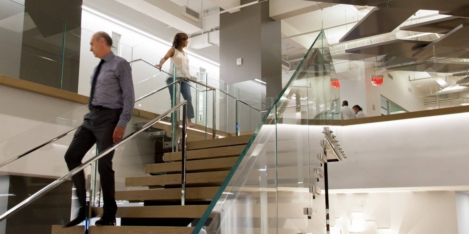June 12, 2018
Firms ignoring employee anxieties about workplace communications
 UK companies are failing to support employees suffering with work-related performance anxiety, the business world’s equivalent to stage fright, despite it being a regular occurrence for many workers, according to new research. RADA Business, the commercial subsidiary of the Royal Academy of Dramatic Art which provides communication skills training for corporate individuals, has published the report Beating Workplace Performance Anxiety, which surveyed 1000 workplaces. The report found that, on average, workers report feeling anxious at least once a week (five times per month). Despite this, few workplaces act effectively to counter incidents of workplace communications anxiety. Only 13 percent of people surveyed said that anxieties round communicating in the workplace are picked up and resolved by the management team.
UK companies are failing to support employees suffering with work-related performance anxiety, the business world’s equivalent to stage fright, despite it being a regular occurrence for many workers, according to new research. RADA Business, the commercial subsidiary of the Royal Academy of Dramatic Art which provides communication skills training for corporate individuals, has published the report Beating Workplace Performance Anxiety, which surveyed 1000 workplaces. The report found that, on average, workers report feeling anxious at least once a week (five times per month). Despite this, few workplaces act effectively to counter incidents of workplace communications anxiety. Only 13 percent of people surveyed said that anxieties round communicating in the workplace are picked up and resolved by the management team.










 One in 10 women blame workplace banter for causing mental health issues and are twice as likely as men to have been negatively affected by workplace banter, according to a new report by The Institute of Leadership & Management. Banter: Just a bit of fun or crossing the line? found that more women (twice as many at 20 percent) were made to feel less confident than their male colleagues due to the negative banter they experienced and 10 percent of women said banter has had a negative impact on their mental health, compared to just three percent of men. The survey also revealed that those at the mid-way point in their careers (31-40 years) are most affected by banter. This age group reported loss in confidence, drops in performance and poor mental health due to experiencing negative banter. They also said they avoided work situations and skipped work socials. The findings showed that over a third of graduate trainees have been left embarrassed by banter and people (over 1 in 4) in their first job are more likely to avoid work socials than any other group as a result of banter.
One in 10 women blame workplace banter for causing mental health issues and are twice as likely as men to have been negatively affected by workplace banter, according to a new report by The Institute of Leadership & Management. Banter: Just a bit of fun or crossing the line? found that more women (twice as many at 20 percent) were made to feel less confident than their male colleagues due to the negative banter they experienced and 10 percent of women said banter has had a negative impact on their mental health, compared to just three percent of men. The survey also revealed that those at the mid-way point in their careers (31-40 years) are most affected by banter. This age group reported loss in confidence, drops in performance and poor mental health due to experiencing negative banter. They also said they avoided work situations and skipped work socials. The findings showed that over a third of graduate trainees have been left embarrassed by banter and people (over 1 in 4) in their first job are more likely to avoid work socials than any other group as a result of banter.
 As employment levels rise, employers are facing stronger competition to attract and retain staff. Now the latest research suggests there is an escalation in the ‘war for talent’, as nine out of 10 new hires admit they would leave a job that fails to meet expectations within a month. According to research commissioned by Robert Half of 9,000 candidates in 11 countries across four continents, nearly half (47 percent) admit they decide whether they would or wouldn’t accept a position straight after the initial meeting. Highlighting that first impressions count, a further one fifth (20 percent) know if they are interested after the first communication (call/email), while 17 percent typically decide within the first five minutes of the interview. Less than one in 10 (9 percent) wait until they have completed subsequent interviews to decide and merely 7 percent decide during contractual negotiations. Even once candidates have accepted a role, 91 percent admit they would consider leaving a job within their first month and 93 percent during their probation period.
As employment levels rise, employers are facing stronger competition to attract and retain staff. Now the latest research suggests there is an escalation in the ‘war for talent’, as nine out of 10 new hires admit they would leave a job that fails to meet expectations within a month. According to research commissioned by Robert Half of 9,000 candidates in 11 countries across four continents, nearly half (47 percent) admit they decide whether they would or wouldn’t accept a position straight after the initial meeting. Highlighting that first impressions count, a further one fifth (20 percent) know if they are interested after the first communication (call/email), while 17 percent typically decide within the first five minutes of the interview. Less than one in 10 (9 percent) wait until they have completed subsequent interviews to decide and merely 7 percent decide during contractual negotiations. Even once candidates have accepted a role, 91 percent admit they would consider leaving a job within their first month and 93 percent during their probation period.










 With companies holding ever greater amounts of data and facing heightened scrutiny through social media, employers need to consider the wider implications of their business decisions. This was the message of the President of the
With companies holding ever greater amounts of data and facing heightened scrutiny through social media, employers need to consider the wider implications of their business decisions. This was the message of the President of the 










June 11, 2018
Coworking is breaking away from its cultural and geographical stereotypes
by Gary Chandler • Comment, Property, Technology, Workplace design
(more…)